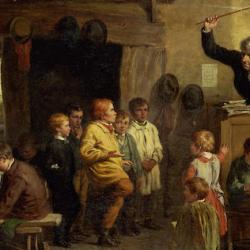Allison Benedikt doesn’t know me, but she thinks I’m a bad person. Not “murderer bad,” mind you. Just “ruining-one-of-our-nation’s-most-essential-institutions-in-order-to-get-what’s-best-for-your-kid” bad. That kind of bad, which is “pretty bad.”
I’m a bad person because I’ve never sent my kids to public school. My wife and I home-schooled all of them at least through elementary school, and then sent them to private Christian schools. I’m worse than most because I’m guilty of not-sending a whole bunch of kids. In fact, Benedikt may think I’m bad just for having as many kids as I do. An issue for another day.
Benedikt acknowledges that she got a horrible education in public school, but she thinks the schools are worth saving and that they can be saved, so long as everyone is invested, really invested.
She doesn’t understand why people have abandoned the public schools. She doesn’t try to understand. Apparently, her only research was to ask her “(morally bankrupt) colleagues” why they send their kids to private school.
Her explanations are of this order: “Rich people will always find a way to game the system.” Some parents send their kids to private school “for prestige or out of loyalty to a long-standing family tradition” or because they hope their kids will grow up to be Allison Benedikts who write for Slate. She acknowledges that some have “religious reasons” but doesn’t seem curious to find out what those religious reasons may be.
I suspect Benedikt exaggerates for the fun of it. Does she actually regard her colleagues are morally bankrupt? Can anyone close an article with “Don’t just acknowledge your liberal guilt—listen to it” without a flicker of a wink? I hope not.
Benedikt, in any case, is flat wrong to assume that parents like her colleagues are leading the flight from the public schools. Many parents who home school or send their kids to Christian schools don’t belong to anything close to the category of “rich people” and they aren’t seeking “prestige” or a column at Slate.
Most didn’t abandon the public schools until the public schools abandoned them. Once upon a time, public schools reinforced parents’ faith and morality. If schools were merely neutral, many religious parents could stomach it, and fill in what’s missing with religious education at home and at church or synagogue. But the public schools aren’t neutral. A Court-enforced prohibition of prayer isn’t a balanced stance between the options of “praying” and “not praying.”
It’s not complicated: Parents are paying for an education that won’t subvert, but will support, their beliefs. They want schools that will encourage their children to adopt those beliefs because they believe those beliefs are true.
Another, subtler shift is at work too. Over the past half-century, Christians have learned to think in “worldviews.” Whatever the problems of worldviewishness, it hit on a basic truth: Since Jesus is Lord of all, He is relevant to all. Jesus isn’t merely the Lord of Sunday or of religious life; He is Lord of the week and of everything in it. If it’s actually true that “all treasures of wisdom and knowledge” are hidden in Christ, then an education that ignores or marginalizes Him can’t be communicating wisdom or knowledge.
Parents gripped by this vision of life aren’t satisfied with a secular curriculum with a patina of prayer.
Benedikt does get one thing exactly right: The abandonment of the public schools is a high-stakes move, higher stakes that many might realize. The public schools were conceived catechetical schools for democracy, eventually of secularism. Leaving them is a breach of the secular social contract, and it is indeed a threat to “one of our nation’s most essential institutions.”
By creating a parallel educational system, believers began to form a parallel America. The jury’s still out on whether the two Americas can hold together.















